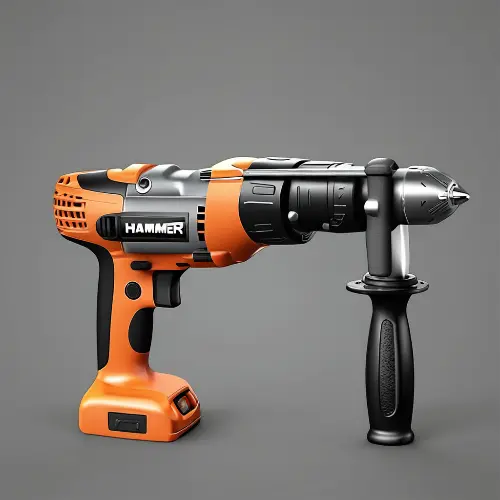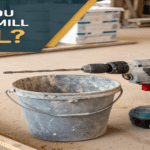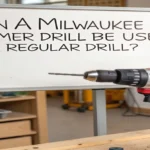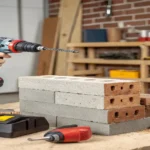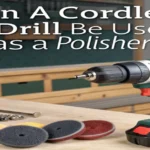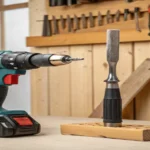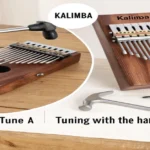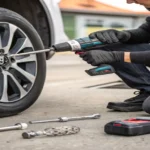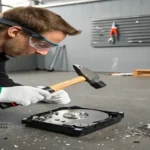Can A Hammer Drill Be Used As A Regular Drill?
Although they may look alike, a hammer drill is not just an ordinary drill. So, do hammer drills make good regular-use drills?
Yes, the answer is you can use a hammer drill as a normal drill in some applications. But there are some differences between a hammer drill and most everyday drills that make it less effective than the latter.
This is a complete guide regarding using Hammer Drill as a Regular drill machine.
In this article, we take a closer look at the most important distinctions between hammer drills and regular electrician drilling style tools for when you can use one in place of one or another — more suits you as an equipment-leveled drill, which is likely tips about how to maximize your resource cores When using them normally Drill.
What’s The Difference Between A Hammer Drill And A Regular Drill?
A hammer drill is also known as a rotary hammer and the primary difference between it and an ordinary impactless drill comes down to its rotating mechanism, which turns strikers inside of that action into pneumatic hammers which makes them capable of drilling any hard materials such as concrete or stone.
As compared to a conventional drill where the steel bit revolves and pokes a hole, in this kind of drilled hammer power smashes as well as moves it forward whilst revolving at the same time which permits for duet actions that chalk up drilling done with fast.
Nonetheless, the following product difference is that the hammering activity is inadequate in boring wood, metal, or plastic.
- Impact Force – Hammer drills generate significantly more force and torque thanks to the hammering action. This makes them better for drilling concrete and masonry.
- Weight – Hammer drills tend to be heavier than regular drills due to the hammering mechanism. This makes them harder to use comfortably for extended periods.
- Price – Hammer drills are more complex and robust so they tend to cost more than regular drills. You’re paying extra for the hammering ability you may not need.
- Drill Bits – Hammer drills often use special SDS or Spline drill bits. You can’t use regular hex drill bits in most rotary hammers.
When Can You Use A Hammer Drill Like A Regular Drill?
So, if you have a regular drill and would like to use it as a hammer one — when can that work most successfully?
Below are the primary benchmarks that indicate a hammer drill can double as your regular deal:
- Light Duty Drilling – For drilling small pilot holes in wood or metal, a hammer drill will work fine as long as you don’t need finesse. The hammering action will be largely useless though.
- Occasional Drilling – If you only need to drill a few holes every so often, a hammer drill will work for most materials. Just don’t expect great precision.
- Drilling Into Masonry – Of course, hammer drills excel at drilling into concrete, brick, and other masonry. This is what they’re designed for.
- No Regular Drill Available – If you don’t have a regular drill but need to drill some holes, a hammer drill will get the job done in a pinch.
- Cordless Convenience – Cordless hammer drills provide extra convenience for drilling away from power outlets. Just note the reduced runtime versus corded.
So in summary, for occasional light-duty drilling into common materials like wood and metal, a hammer drill can be used with decent results, especially if you don’t have another option available.
When Should You Use A Regular Drill Instead?
Even though you can use hammer drills as a regular drill, there are several instances where it makes far more sense to invest in an actual dedicated regular drill:
- Precision Drilling – For holes that need to be exact, smooth, and splinter-free, a regular drill is best. Hammer drills lack the finesse and control.
- Heavy Duty Use – If you need to drill many holes throughout the day, opt for a lighter regular drill. Hammer drills get tiring.
- Soft Materials – The hammering action is wasted in soft woods and plastics so you’re better off with a regular drill.
- Metal Drilling – Hammer drills can distort thin sheets of metal. Regular drills give a cleaner cut.
- Noise – Hammer drills are very loud compared to regular drills due to the hammering mechanism.
To sum it up, the high-quality standard drill would be better for precision work and finesse while offering a quieter process.
Tips For Using A Hammer Drill As A Regular Drill
If you do need to use a hammer drill for regular drilling, here are some tips to get the best results:
- Use Normal Drill Bits – Standard twist or spade bits work better than SDS hammer drill bits for regular drilling.
- Get A Clutch Model – Opt for a clutch hammer drill so you can disengage the hammer function completely.
- Use The Lowest Torque Setting – Set the torque limiter to the minimum to reduce power for better control.
- Push Gently – Don’t force the drill, let the bit do the work, especially in soft materials.
- Try A Faster Speed – Faster RPM can give cleaner cuts in wood and plastic.
- Keep It Cool – Take breaks to avoid overheating the motor which can shorten its life.
- Add A Side Handle – Side handles improve control and reduce strain when using large bits.
Following these tips will help you have success and avoid potential issues when drilling with a hammer drill. It takes some practice but can get the job done.
FAQs
Would I be able to use hammer penetrate pieces in a standard penetrate?
No, you can’t utilize uncommon SDS or Spline hammer drill bits in a typical standard bore. They require the effect hammering activity to penetrate appropriately.
Is it alright to use a hammer drill just for drilling into wood?
Indeed, you can securely utilize a hammer drill to penetrate into wood materials. Simply note that the hammering activity is to a great extent pointless in wood so a standard penetrate may be a superior alternative.
What happens when you use a hammer drill without hammer action?
When you press the lever to disable the hammer action, a rotary hammer works like a standard drill with extra weight. When the drill bit rotates, it drills holes into wood, metal, plastic, etc.
Can I use an ordinary drill to make holes in brickwork/concrete?
A regular drill with a masonry bit is all you need to be able to drill holes in concrete, brick, or masonry. It’s a slow and tedious process. For this, it would be easier with a hammer drill.
Is it bad to use a hammer drill for long periods?
Using a hammer drill for extended periods can lead to more rapid wear thanks to the added impact. Regular drills are designed for longer continuous use. Take breaks to extend the life of your hammer drill.
Conclusion
Yet hammer drills and regular drills look much alike? Hammer drills could replace regular drills for drilling holes, but they work best for masonry drilling instead.
You’ll save a lot of cash for most DIY tasks and precision work if you purchase an inexpensive regular drill. Choose your next drill based on concrete versus wood and metal drilling frequency.
Key Things To Remember
- Hammer drills add hammering action for hard materials like concrete
- They can be used as regular drills but lack precision and finesse
- Opt for a regular drill for frequent use, soft materials, and precision
- Disable the hammer function and use normal drill bits
- Take care not to overheat or overload a hammer drill

I’m Ian Welkins, a seasoned professional in the tools industry. My passion drives me to share valuable insights on hammers, drills, and industrial tools. With years of experience, I’m your trusted source for expert advice on the best tools for every job.
